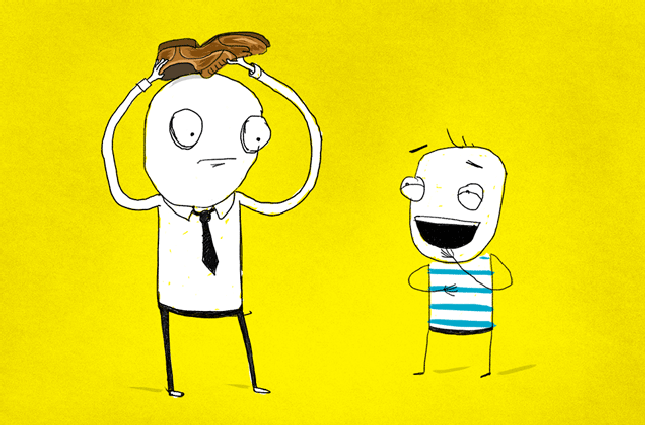Let's Hear It For Goofy Dads
Latest

It’s Father’s Day, so let this be the year we all finally recognize that dads and their goofy dad stuff—monster faces, silliness, mockery; perhaps even dad jokes, if the judges are feeling lenient—could be as essential to childrearing as any of that mom stuff. Or, at least, that a Platonic ideal of “mom” is not the ultimate standard for parenting. Who’s with me?! Moms and dads are different! But equal!
Standard research that looks at how parents bond with their children has typically focused on moms and used mom-styled parenting as the line to which everything else must measure up. After all, moms kind of do all the work—and have for most of history, whether they felt up to the task or not. But in spite of all the good aspects dads bring to the rearing of their children, they haven’t historically scored well on bonding tests. That’s all changed, thanks to new research.
In a piece over at the WSJ, Sue Shellenbarger looks at studies from the last two years that focus on the ways in which uniquely “dad” approaches to parenting are a valid and useful part of bonding between parent and child and also child development. Shellenbarger talks to Dr. Kathryn Kerns, a psychological sciences professor at Kent State who discovered that, when she surveyed 30 teens and preteens about their relationships with their dads, many kids described their dads in warm terms but gave answers that put their dads in a low score range on Kerns’s standard bonding test. She found that, when she tweaked the test to add questions about whether dads were encouraging and/or enriching, the scores went up.
Shellenbarger writes:
Dr. Kerns is one of a growing number of researchers creating new tests and techniques to document the father factor. More than a dozen studies in the past two years are yielding new insights into the nuances, and the value, of the seemingly random, sometimes silly play many dads engage in with their children.
The research could offer dads more leeway in their play with children, suggesting there’s no need for moms or others to worry when fathers stir up or challenge their children—as long as the kids are happy and having fun. Also, dads sometimes can stop a child’s fussing or crying through joking or physical play.
It’s hard for me to imagine that no mothers have ever used these silly tactics, or that if they did, joking or physical play would actually be ranked somehow lower than calming a child with soothing or comforting—whatever works, right? This stuff also has something to do with temperament and disposition. But the important thing to note here is that exploration and risk-taking—things typically more associated with dad parenting—have been getting short shrift in these studies. They shouldn’t, nor should other methods dads might use more often to get a kid to calm down so long as they are effective and not harmful, like using intrusiveness or interruption. The equalization of parenting techniques will be good for everyone: Research shows that when moms interrupt a child’s play or pick a game for them, it’s regarded as a bad thing, but when dads do, it isn’t.
Other research Shellenbarger cites includes “The Laughing Task,” where parents are given two minutes to make their child laugh in a room with no toys. Children were said to display a more expansive range of feeling with dads, evincing an invaluable regulation skill that allows kids to work on self-control while excited. (Mothers were more bothered by the lack of toys, apparently, but just as skilled at producing the laughs, and with more sensitivity.)
-

-

-

-

-

-

-

-

-

-

-

-

-

-

-

-

-

-

-

-

-

-

-

-

-

-

-

-

-

-

-

-

-

-

-

-

-

-

-

-








































